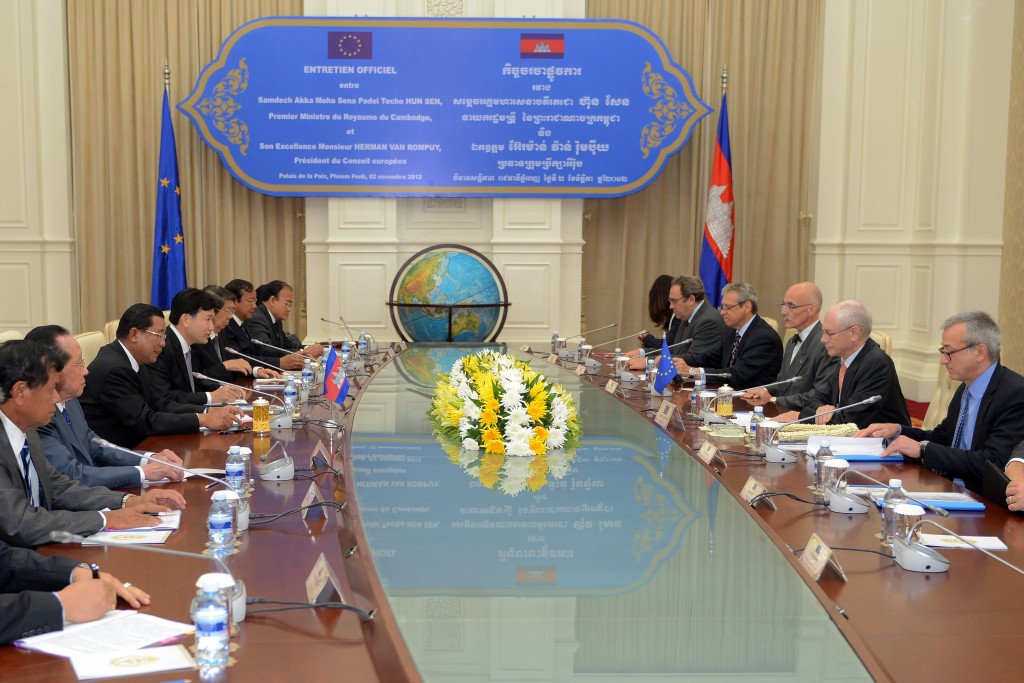
នាយករដ្ឋមន្រ្តី នៃប្រទេសកម្ពុជា ហ៊ុន សែន (ជួរទី៣ ខាងឆ្វេង) និយាយទៅកាន់ ប្រធានក្រុមប្រឹក្សាអឺរ៉ុប Herman Van Rompuy (ជួរទី២ ខាងស្តាំ) ទៅវិមានសន្តិភាព ប្រទេសកម្ពុជា។ រូបថត ថតដោយ ប្រធានក្រុមប្រឹក្សាអឺរ៉ុប កាលពីថ្ងៃទី២ ខែវិច្ឆិកា ឆ្នាំ២០១២។ ក្រោមអាជ្ញាប័ណ្ណ CC BY-NC-ND 2.0
នៅនីតិកាលនីមួយៗនៃសភា រាជរដ្ឋាភិបាលនៃប្រទេសកម្ពុជា អង្គនីតិប្រតិបត្តិ ត្រូវបានបង្កើតឡើងសម្រាប់អាណត្តិ៥ឆ្នាំ តាមរយៈការបោះឆ្នោតជាសកល និងដោយផ្ទាល់។ តាមការស្នើសុំរបស់ប្រធានរដ្ឋសភា និងដោយមានការយល់ព្រមពីអនុប្រធានទាំងពីរ ព្រះមហាក្សត្រ ក្នុងនាមជាព្រះប្រមុខរដ្ឋ តែងតាំងឥស្សរជនជាន់ខ្ពស់មួយរូប ដែលជាសមាជិកគណបក្សនយោបាយឈ្នះឆ្នោត ឲ្យបង្កើតគណៈរដ្ឋមន្ត្រី។ ក្រោយពីការបោះឆ្នោតជាតិឆ្នាំ២០១៣ រាជរដ្ឋាភិបាល អាណត្តិទី៥ ត្រូវបានបង្កើតឡើង។1
គណៈរដ្ឋមន្ត្រី ក្រសួង និងស្ថាប័នជាតិ អាចមានការប្រែរប្រួលទាំងសមាសភាព និងសមាជិកភាព។ ព្រះរាជក្រឹត្យ អាចកែរសម្រួលទៅលើសមាសភាពគណៈរដ្ឋមន្ត្រី និងថ្នាក់ដឹកនាំនៅតាមក្រសួង និងស្ថាប័នជាតិផ្សេងៗ។ នេះ មានន័យថា មិនមែនគ្រប់សមាជិកទាំងអស់នៃគណៈរដ្ឋមន្ត្រី ចាំបាច់ទទួលការការបោះឆ្នោតទុកចិត្តពីរដ្ឋសភានោះទេ ដែលការបោះឆ្នោតទុកចិត្តនេះ តែងតែធ្វើនៅដើមអាណត្តិរាជរដ្ឋាភិបាលប៉ុណ្ណោះ។
សមាជិករាជរដ្ឋាភិបាលស្ទើរតែទាំងអស់ គឺជាប្រធានក្រសួង និងស្ថាប័នជាតិ។ ក្នុងគោលបំណងរក្សាឯករាជ្យភាពរបស់ស្ថាប័នទាំងនេះពីរាជរដ្ឋាភិបាល ប្រធាន និងសមាជិកស្ថាប័នជាតិខ្លះ មិនមែនជាសមាជិករាជរដ្ឋាភិបាលទេ។ ទាំងនេះ មានន័យថា ស្ថាប័នជាតិទាំងនេះ មិនមែនជាផ្នែកនៃអង្គនីតិប្រតិបត្តិ អង្គនីតិប្បញ្ញត្តិ និងអង្គតុលាការទេ ប៉ុន្តែជាស្ថាប័នជាតិឯករាជ្យដោយឡែក។
ក្រសួងស្ទើរតែទាំងអស់ ត្រូវបានបង្កើតឡើង នៅឆ្នាំ១៩៩៥ ។ ក្រសួងតិចតួចប៉ុណ្ណោះ ទើបតែត្រូវបានបង្កើតឡើងនាពេលថ្មីៗនេះ ដោយការបំបែកក្រសួងមួយ ឲ្យទៅជាក្រសួងពីរផ្សេងគ្នា2 ឬដោយការតំឡើងថ្នាក់ពីរដ្ឋលេខាធិការដ្ឋាន មកជាក្រសួង3 ។ សព្វថ្ងៃនេះ រាជរដ្ឋាភិបាលនៃប្រទេសកម្ពុជា មានក្រសួងនិងរដ្ឋលេខាធិការដ្ឋាន មានចំនួនសរុប ២៨ ព្រមទាំងស្ថាប័នជាតិមួយចំនួនផ្សេងទៀត ដូចមានរាយឈ្មោះត្រួសៗខាងក្រោម។
ស្ថាប័នជាតិមួយចំនួន មានចែងក្នុងរដ្ឋធម្មនុញ្ញ ហើយមួយចំនួនទៀតមាន ប្បញ្ញត្តិក្នុងច្បាប់។ ខណៈដែលស្ថាប័នជាតិ ត្រូវបង្កើតឡើងដោយច្បាប់ ឬព្រះរាជក្រឹត្យ ការរៀបចំ និងការប្រព្រឹត្តទៅនៃស្ថាប័នទាំងនេះ ត្រូវកំណត់ដោយអនុក្រឹត្យរបស់រាជរដ្ឋាភិបាល (ដើម្បីស្វែងយល់អំពីប្រភេទ ឋានានុក្រម និងនីតិវិធីច្បាប់ នៃអត្ថបទច្បាប់ពាក់ព័ន្ធ សូមចូលទៅកាន់ ច្បាប់ និងប្រព័ន្ធតុលាការ)។
កំណែទម្រង់គួរឲ្យកត់សម្គាល់ ដែលកើតឡើងជាមួយនឹងស្ថាប័នជាតិភាគច្រើន កើតឡើងភ្លាមៗ នៅក្រោយពីការបោះឆ្នោតជាតិឆ្នាំ២០១៣។ ស្ថាប័នជាតិទាំងនោះ លែងដាក់ឲ្យស្ថិតនៅក្រោមទីស្តីការគណៈរដ្ឋមន្ត្រី ហើយ ប៉ុន្តែនៅក្រោមក្រសួងទទួលបន្ទុក នៃរាជរដ្ឋាភិបាល។4 កំនែទម្រង់នេះ មានគោលដៅរៀបចំ និងដាក់បញ្ចូលស្ថាប័នជាតិទទួលបន្ទុកតាមវិស័យទាំងនោះ ទៅក្នុងរចនាសម្ព័ន្ធនៃក្រសួងជាប់ពាក់ព័ន្ធ។
បញ្ជីឈ្មោះក្រសួង និងស្ថាប័នជាតិនៃរាជរដ្ឋាភិបាល មានដូចខាងក្រោមនេះ។ តំណរភ្ជាប់នីមួយៗ នឹងផ្តល់ជូនព័ត៌មានលម្អិតបន្ថែមអំពីយុត្តាធិការ និងវិស័យទទួលខុសត្រូវរបស់ក្រសួង ឬស្ថាប័នជាតិនីមួយៗ។ បណ្តុំនៃព័ត៌មាន និងទិន្នន័យ អាចរកបាននៅតាមគេហទំព័ររបស់ក្រសួង និងស្ថាប័ននីមួយៗ។
ក្រសួង និងរដ្ឋលេខាដ្ឋាន
- ទីស្តីការគណៈរដ្ឋមន្រ្តី
- ក្រសួងកសិកម្ម រុក្ខាប្រមាញ់ និងនេសាទ
- ក្រសួងមុខងារសាធារណៈ
- ក្រសួងពាណិជ្ជកម្ម
- ក្រសួងធម្មការ និងសាសនា
- ក្រសួងវប្បធម៌ និងវិចិត្រសិល្បៈ
- ក្រសួងសេដ្ឋកិច្ច និងហិរញ្ញវត្ថុ
- ក្រសួងអប់រំ យុវជន និងកីឡា
- ក្រសួងបរិស្ថាន
- ក្រសួងការបរទេស និងសហប្រតិបត្តិការ
- ក្រសួងសុខាភិបាល
- ក្រសួងឧស្សាហកម្ម និងសិប្បកម្ម
- ក្រសួងព័ត៌មាន
- ក្រសួងមហាផ្ទៃ
- ក្រសួងយុត្តិធម៌
- ក្រសួងការងារ និងបណ្តុះបណ្តាលវិជ្ជាជីវៈ
- ក្រសួងរៀបចំដែនដី នគរូបនីយកម្ម និងសំណង់
- ក្រសួងរ៉ែ និងថាមពល
- ក្រសួងការពារជាតិ
- ក្រសួងទំនាក់ទំនងរដ្ឋសភា-ព្រឹទ្ធសភា និងអធិការកិច្ច
- ក្រសួងផែនការ
- ក្រសួងប្រៃសណីយ៍និងទូរគមនាគមន៍
- ក្រសួងសាធារណការ និងដឹកជញ្ជូន
- ក្រសួងសង្គមកិច្ច អតីតយុទ្ធជន និងយុវនីតិសម្បទា
- ក្រសួងទេសចរណ៍
- ក្រសួងធនធានទឹក និងឧតុនិយម
- ក្រសួងកិច្ចការនារី
- រដ្ឋលេខាធិការដ្ឋានអាកាសចរស៊ីវិល
ស្ថាប័នជាតិសំខាន់ៗ
- ធនាគារជាតិនៃកម្ពុជា
- ក្រុមប្រឹក្សាអភិវឌ្ឍន៍កម្ពុជា
- ឧត្តមក្រុមប្រឹក្សាសេដ្ឋកិច្ចជាតិ
- ក្រុមប្រឹក្សាធម្មនុញ្ញ
- គណៈកម្មាធិការជាតិរៀបចំការបោះឆ្នោត
- វិទ្យាស្ថានជាតិស្ថិតិ
- អាជ្ញាធរទន្លេសាប
- អាជ្ញាធរជាតិដោះស្រាយទំនាស់ដីធ្លី
- អាជ្ញាធរជាតិអប្សរា
- អាជ្ញាធរកម្ពុជាគ្រប់គ្រងសកម្មភាពកំចាត់មីន និងសង្រ្គោះជនពិការដោយមីន
- អាជ្ញាធរជាតិប្រយុទ្ធនឹងជំងឺអេដស៍
- អាជ្ញាធរជាតិប្រយុទ្ធប្រឆាំងគ្រឿងញៀន
- អាជ្ញាធរជាតិទទួលបន្ទុកកិច្ចការអភិវឌ្ឍន៍វិស័យបច្ចេកវិទ្យា គមនាគមន៍ ព័ត៌មានវិទ្យា
- អាជ្ញាធរអគ្គិសនីកម្ពុជា
- អង្គភាពប្រឆាំងអំពើពុករលួយ
- ឧត្តមក្រុមប្រឹក្សាការពារជាតិ
- ឧត្តមក្រុមប្រឹក្សាជាតិអប់រំ
ទាក់ទងនឹងក្រសួងនិងស្ថាប័នរដ្ឋ
បច្ចុប្បន្នភាពចុងក្រោយ ថ្ងៃទី ២៩ ខែកញ្ញា ឆ្នាំ២០១៥
ឯកសារយោង
- 1. ព្រះរាជក្រឹត្យលេខ នស/រកម/០៩១៣/៩០៣ ចុះថ្ងៃទី ២៤ ខែកញ្ញា ឆ្នាំ២០១៣។
- 2. ក្រសួងឧស្សាហកម្ម និងសិប្បកម្ម ត្រូវបានបង្កើតឡើងដោយព្រះរាជក្រម លេខ នស/រកម/១២១៣/០១៨ ចុះថ្ងៃទី ៦ ខែធ្នូ ឆ្នាំ២០១៣។ ក្រសួងរ៉ែ និងថាមពល ត្រូវបានបង្កើតឡើងដោយព្រះរាជក្រម លេខ នស/រកម/១២១៣/០១៧ ចុះថ្ងៃទី ៦ ខែធ្នូ ឆ្នាំ២០១៣។
- 3. ក្រសួងមុខងារសាធារណៈ ត្រូវបានបង្កើតឡើង ដោយព្រះរាជក្រម លេខ នស/រកម/១២១៣/០១៦ ចុះថ្ងៃទី ៦ ខែធ្នូ ឆ្នាំ២០១៣។
- 4. គណៈកម្មាធិការជាតិសម្រាប់ការអភិវឌ្ឍតាមបែបប្រជាធិបតេយ្យនៅថ្នាក់ក្រោមជាតិ. “ក្របខណ្ឌច្បាប់៖ បញ្ជីព្រះរាជក្រឹត្យស្តីពីការធ្វើសមាហរណកម្មស្ថាប័នជាតិ ទៅតាមបណ្តាក្រសួង”។ ចូលអាននៅថ្ងៃទី ២ ខែកញ្ញា ឆ្នាំ២០១៥, http://lb.ncdd.gov.kh/Share/Doc%20in%20Library-3/REGULATION/ROYALDECREE/RDE-%20Integration%20of%20instutions%20-2013.pdf

